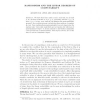Free Online Productivity Tools
i2Speak
i2Symbol
i2OCR
iTex2Img
iWeb2Print
iWeb2Shot
i2Type
iPdf2Split
iPdf2Merge
i2Bopomofo
i2Arabic
i2Style
i2Image
i2PDF
iLatex2Rtf
Sci2ools
119
click to vote
APAL
2007
2007
Randomness and the linear degrees of computability
We show that there exists a real α such that, for all reals β, if α is linear reducible to β (α ≤ β, previously denoted α ≤sw β) then β ≤T α. In fact, every random real satisfies this quasi-maximality property. As a corollary we may conclude that there exists no -complete ∆2 real. Upon realizing that quasi-maximality does not characterize the random reals—there exist reals which are not random but which are of quasi-maximal -degree—it is then natural to ask whether maximality could provide such a characterization. Such hopes, however, are in vain since no real is of maximal -degree.
Related Content
| Added | 08 Dec 2010 |
| Updated | 08 Dec 2010 |
| Type | Journal |
| Year | 2007 |
| Where | APAL |
| Authors | Andrew E. M. Lewis, George Barmpalias |
Comments (0)

